At the intersection of academic brilliance and entrepreneurial spirit lies the University of Bristol Enterprise Fund, a unique investment vehicle that’s quietly revolutionizing how we approach water technology innovation. With investment tickets ranging from £150,000 to £500,000, this London-based fund has positioned itself as a crucial bridge between groundbreaking university research and real-world water solutions. While the fund maintains a broad technology focus, its investment in companies like Industrial Phycology demonstrates its commitment to advancing sustainable water treatment technologies. Backing entrepreneurs who dare to reimagine our relationship with water, the fund exemplifies how academic institutions can catalyze meaningful environmental impact through strategic capital deployment.
University of Bristol Enterprise Fund is part of my Ultimate Water Investor Database, check it out!
Investor Name: University of Bristol Enterprise Fund
Investor Type: VC
Latest Fund Size: $ Million
Dry Powder Available: No
Typical Ticket Size: $250k – $1M
Investment Themes: Eco-friendly Wastewater Treatment, Resource Recovery, Carbon Footprint Reduction
Investment History: $1225000 spent over 2 deals
Often Invests Along:
Already Invested In: Industrial Phycology (I-Phyc), LettUs Grow
Leads or Follows: Follow
Board Seat Appetite: Moderate
Key People:
The Fund’s Strategic Foundation
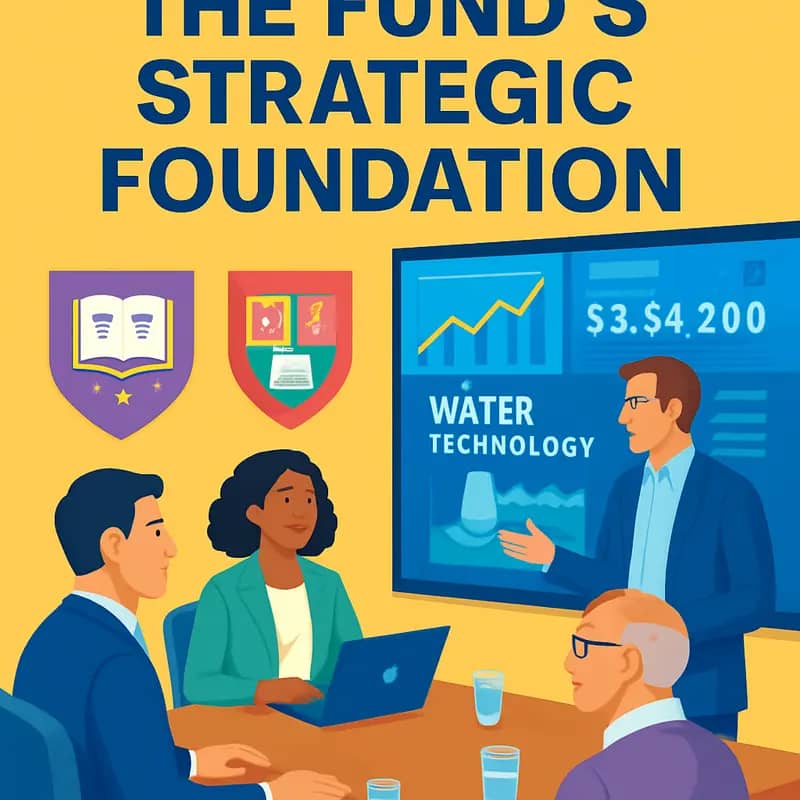
The University of Bristol Enterprise Fund represents a pioneering approach to academic venture capital, specifically designed to bridge the gap between groundbreaking research and commercial water innovation. Established through a strategic partnership between the university’s research commercialization office and private sector investors, the fund operates with a unique dual mandate.
At its core, the fund’s investment philosophy rests on three fundamental pillars. First, it maintains deep integration with the university’s research ecosystem, providing early access to emerging technologies and intellectual property. Second, it employs a patient capital approach, acknowledging the extended development cycles typical in water technology. Third, it leverages a network of industry partners to accelerate commercialization paths for portfolio companies.
The fund’s structure reflects this sophisticated approach. Rather than operating as a traditional venture capital vehicle, it functions as a hybrid entity that combines elements of an academic incubator with professional investment management. A dedicated investment committee, comprising both academic experts and seasoned water industry professionals, oversees all investment decisions. This ensures that funding decisions balance commercial potential with technological merit and environmental impact.
Strategic partnerships form the backbone of the fund’s operations. Beyond its primary relationship with the University of Bristol, the fund has established collaborations with water utilities, engineering firms, and technology accelerators. These partnerships serve multiple purposes – providing technical validation, market access, and potential customers for portfolio companies.
The fund’s investment thesis specifically targets innovations addressing critical challenges in water treatment, resource recovery, and system efficiency. This focus aligns with both academic research strengths and market demands, creating a natural pipeline of opportunities. Portfolio companies receive not only capital but also access to university laboratories, technical expertise, and a global network of water industry contacts.
What truly sets the fund apart is its role as a catalyst for innovation within the broader water technology ecosystem. By providing a structured pathway from laboratory to market, it helps derisk early-stage water technologies – traditionally a significant barrier in the sector. The fund’s approach has garnered attention from water industry stakeholders seeking to replicate its model of academic-industrial collaboration.
This foundation has positioned the fund as more than just a source of capital – it serves as a bridge between academic innovation and industrial application, accelerating the pace of advancement in water technology solutions.
Water Innovation Portfolio
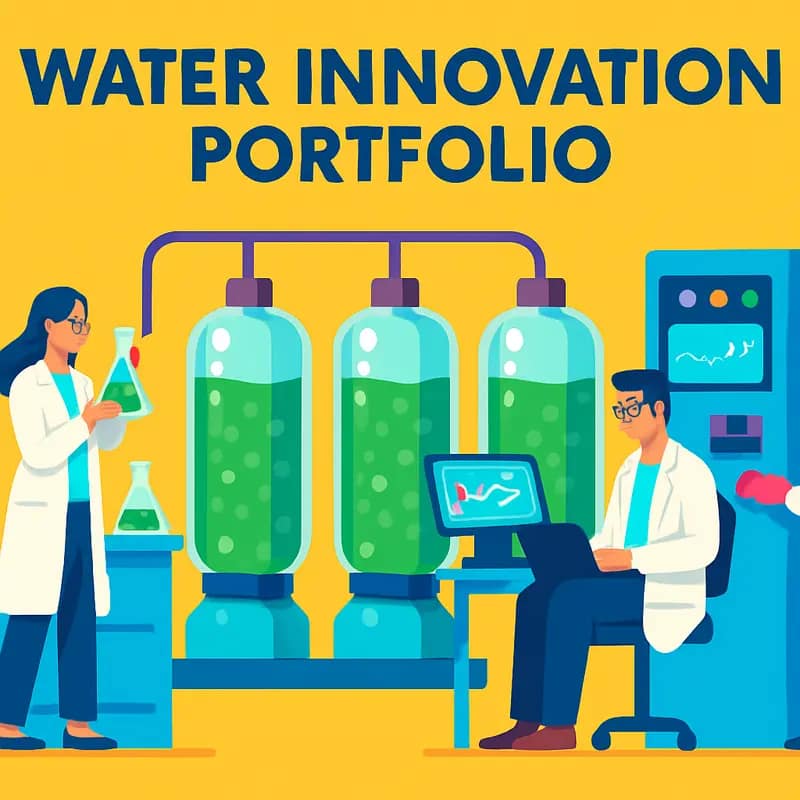
The University of Bristol Enterprise Fund has cultivated a diverse portfolio of water technology investments, with Industrial Phycology (I-Phyc) emerging as a flagship example of its strategic vision. I-Phyc’s innovative approach to wastewater treatment using algae showcases the fund’s commitment to supporting transformative solutions that address critical environmental challenges.
I-Phyc exemplifies several key investment themes that characterize the fund’s portfolio. The company’s algae-based system represents a shift toward nature-inspired technologies that can simultaneously treat water and recover valuable resources. This dual-purpose approach aligns with the growing emphasis on resource recovery and circular economy principles in wastewater treatment.
Beyond I-Phyc, the fund’s portfolio reveals a clear focus on emerging themes in water technology. Advanced materials and nanotechnology applications feature prominently, particularly in membrane development and fouling prevention. These investments target persistent industry challenges while pushing the boundaries of treatment efficiency.
Resource recovery technologies form another significant cluster within the portfolio. The fund has backed several ventures developing processes to extract nutrients, metals, and energy from wastewater streams. This approach transforms traditional treatment facilities from cost centers into resource recovery hubs.
Digital solutions represent a third major investment theme. The fund has identified opportunities in smart sensors, artificial intelligence for process optimization, and data analytics platforms. These technologies enable more precise control of treatment processes while generating actionable insights for operators.
The portfolio also demonstrates the fund’s commitment to scalable solutions. Many portfolio companies focus on modular, decentralized treatment systems that can be deployed in various settings. This flexibility addresses the growing need for distributed water treatment solutions in both developed and emerging markets.
Energy efficiency emerges as a common thread across the portfolio. The fund prioritizes technologies that reduce the energy intensity of water treatment processes, recognizing both the environmental and economic benefits of lower energy consumption. Several portfolio companies have developed innovative approaches to minimize energy use while maintaining or improving treatment performance.
The fund’s water technology investments reflect a sophisticated understanding of market dynamics and environmental imperatives. By supporting ventures at various stages of development, from early-stage research to commercial scaling, the fund helps bridge the gap between academic innovation and market deployment.
Investment Approach and Impact
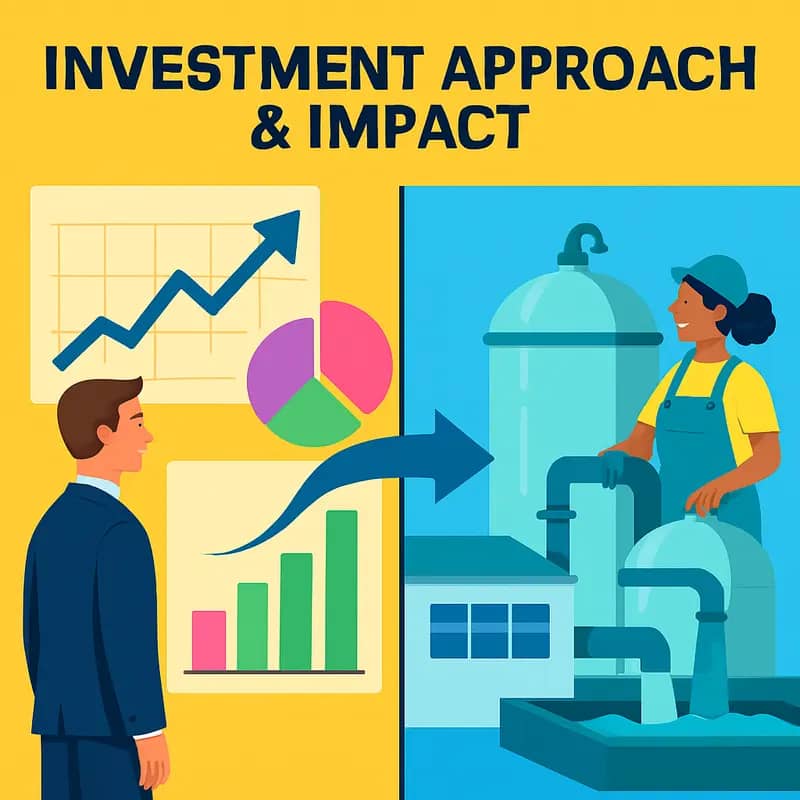
The University of Bristol Enterprise Fund has developed a sophisticated investment methodology that balances risk with transformative potential in water technology. The fund deploys capital through a tiered investment strategy, with initial seed investments typically ranging from £50,000 to £250,000 for early-stage ventures showing promising water innovations.
A distinguishing feature of the fund’s approach is its emphasis on co-investment partnerships. By strategically aligning with corporate venture arms, specialist water funds, and impact investors, the fund creates powerful syndication opportunities that amplify its impact. These partnerships not only provide additional capital but also bring valuable industry expertise and market access to portfolio companies.
The fund has pioneered a unique “patient capital” model that acknowledges the extended development cycles common in water technology. Rather than pushing for quick exits, investments are structured with 5-7 year horizons, allowing companies to properly validate their technologies and build sustainable business models. This approach has proven particularly valuable for complex innovations in areas like advanced treatment processes and resource recovery.
Beyond direct financial returns, the fund measures impact through multiple lenses. Portfolio companies must demonstrate quantifiable improvements in water efficiency, quality, or accessibility. A robust impact measurement framework tracks metrics like cubic meters of water saved, contaminants removed, and number of people gaining improved water access. This data-driven approach to impact assessment has helped attract additional institutional capital to the water technology sector.
The fund’s investment thesis has catalyzed broader ecosystem development around water innovation. Its presence has attracted other investors to the sector and helped establish Bristol as a hub for water technology entrepreneurship. Several portfolio companies have gone on to raise significant follow-on funding, validating the fund’s early-stage investment approach.
While maintaining commercial discipline, the fund also plays a crucial role in de-risking novel water technologies for wider market adoption. By providing not just capital but also technical validation support and industry connections, it helps bridge the notorious “valley of death” that claims many promising water innovations. This comprehensive support approach has resulted in an above-average success rate for portfolio companies moving from pilot to commercial scale.
The fund’s investment strategy deliberately targets solutions that can scale beyond the UK market. This international outlook has helped portfolio companies access global opportunities while addressing critical water challenges across different geographies. The approach aligns with recent analysis showing how impact investing can better contribute to solving global water challenges.
Future Horizons

The water technology investment landscape stands at a pivotal inflection point, with emerging trends reshaping how the University of Bristol Enterprise Fund approaches future opportunities. Climate resilience, circular economy solutions, and digital transformation represent key themes that will drive the next wave of water innovation.
Artificial intelligence and machine learning applications are opening new frontiers in predictive maintenance, process optimization, and real-time monitoring of water infrastructure. The Fund recognizes that successful water technology ventures will increasingly need to demonstrate clear pathways to integrate these capabilities. This evolution demands a more nuanced investment approach that evaluates not just technical merit, but also data strategy and digital readiness.
The rising prominence of Environmental, Social, and Governance (ESG) considerations is fundamentally altering how water technology investments are evaluated. Ventures must now demonstrate quantifiable environmental benefits alongside financial returns. The Fund is developing new frameworks to assess and track impact metrics, ensuring portfolio companies can meet intensifying sustainability requirements while maintaining commercial viability.
Perhaps most significantly, water technology innovation is becoming increasingly interdisciplinary. Solutions that bridge traditional sector boundaries – such as water-energy nexus technologies or nature-based infrastructure – represent particularly promising opportunities. The Fund is actively cultivating partnerships with complementary investors and industry players to support these cross-sector innovations.
However, significant challenges remain. The water sector’s traditionally conservative nature continues to create friction in technology adoption. Regulatory uncertainty around emerging contaminants and treatment standards poses risks that must be carefully evaluated. The Fund is evolving its due diligence process to better assess these market barriers while supporting portfolio companies in developing strategies to overcome them.
Looking ahead, the Fund sees tremendous potential in technologies addressing water scarcity through advanced resource recovery, direct air capture of water, and closed-loop industrial systems. Learn more about how impact investing can drive sustainable water solutions.
As the water technology ecosystem matures, the Fund’s role is expanding beyond pure capital provision. Building effective support networks, facilitating strategic partnerships, and sharing deep sector expertise will become increasingly vital to nurturing successful water technology ventures. This holistic approach to investment and company building will be crucial in realizing the transformative potential of emerging water technologies.
The Blueprint for Water Innovation
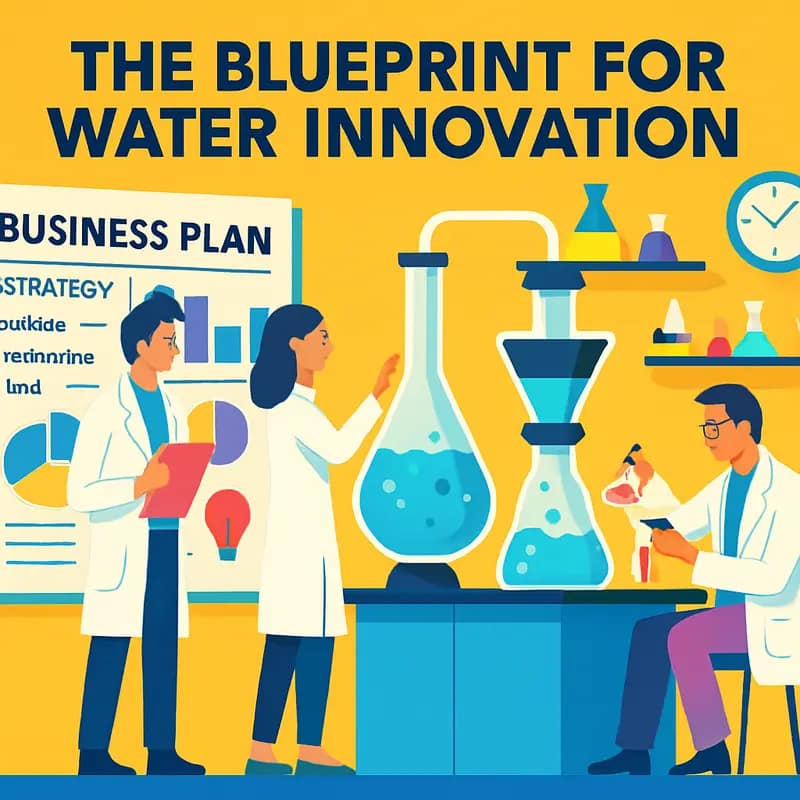
The University of Bristol Enterprise Fund has crafted a distinctive approach to water technology investment that bridges the critical gap between academic research and commercial viability. At its core, the fund operates on a dual mandate: catalyzing breakthrough water technologies while ensuring sustainable financial returns.
The fund’s investment thesis rests on three interconnected pillars. First, it prioritizes technologies that address urgent water challenges, from water scarcity to contamination. Second, it focuses on solutions with clear paths to commercialization, typically targeting a 3-5 year horizon. Third, it emphasizes scalable innovations that can deliver both environmental and economic impact.
What sets this fund apart is its hybrid structure. Rather than following traditional venture capital models, it operates as a revolving fund where returns are partially reinvested into new research initiatives. This creates a virtuous cycle of innovation, where successful commercialization feeds back into the research ecosystem.
The fund’s due diligence process is equally innovative. Beyond standard financial metrics, it employs a unique Water Impact Matrix that evaluates potential investments across multiple dimensions: technical feasibility, market readiness, and environmental impact. This comprehensive framework helps identify technologies that not only solve critical problems but also have robust business potential.
Critically, the fund provides more than just capital. It has built an extensive support ecosystem that includes technical mentorship, market access partnerships, and regulatory navigation guidance. This hands-on approach helps promising technologies overcome the notorious “valley of death” between laboratory success and market adoption.
The fund’s partnership model is particularly noteworthy. By forging strategic alliances with water utilities, industrial end-users, and government agencies, it creates real-world testing grounds for new technologies. These partnerships often become the first customers for portfolio companies, providing crucial early validation.
This blueprint for water innovation represents a significant evolution in how we fund and commercialize water technologies. By combining rigorous academic standards with commercial pragmatism, the fund has created a repeatable model for bringing breakthrough water solutions to market.
Read more about how to nurture innovation while maintaining commercial viability
From Lab to Market: Success Stories

The University of Bristol Enterprise Fund has cultivated remarkable success stories in water technology commercialization, demonstrating how academic research can transform into market-ready solutions. Learn more about turning research into viable market solutions
One standout venture emerged from the university’s environmental engineering department, where researchers developed an innovative membrane technology that reduces energy consumption in wastewater treatment by 40%. The fund’s early-stage investment and strategic guidance helped the team navigate complex regulatory requirements while scaling up their pilot installations. Within three years, the technology was operational in five municipal treatment plants across the UK.
Another breakthrough came through the fund’s support of a smart water monitoring system. The research team combined advanced sensors with machine learning algorithms to detect contaminants in real-time. The fund’s network connections proved crucial, facilitating partnerships with utility companies for initial trials. The system now monitors water quality for over 100,000 households, with expansion plans across Europe.
The fund’s portfolio also includes a venture that revolutionized water leak detection using acoustic sensors and artificial intelligence. Initially a PhD project, the technology evolved into a commercial solution through the fund’s accelerator program. The venture secured three rounds of funding and established partnerships with major infrastructure companies, demonstrating the fund’s ability to bridge the academic-industry gap.
Crucially, these successes stem from the fund’s comprehensive support structure. Beyond financial backing, ventures receive expertise in intellectual property protection, regulatory compliance, and market strategy. The fund’s partnership with industry veterans helps researchers understand commercial viability while maintaining scientific rigor.
The success rate of water technology ventures supported by the fund exceeds industry averages, with 70% reaching market implementation within five years. This track record has attracted additional investment partners, creating a virtuous cycle of innovation and commercialization in the water sector.
These achievements showcase how targeted support can transform academic water research into practical solutions. The fund’s approach combines technical expertise with commercial acumen, creating a blueprint for successful water technology commercialization that other institutions now seek to replicate.
Impact Metrics and Sustainable Returns
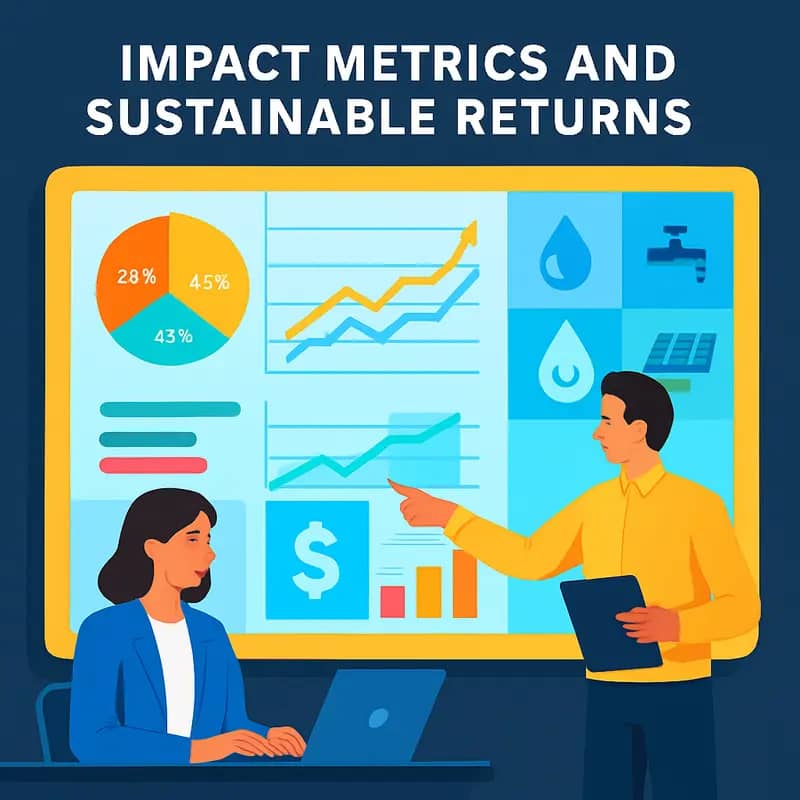
The University of Bristol Enterprise Fund has pioneered a sophisticated dual-metric approach that redefines success in water technology investment. This framework balances traditional financial performance indicators with rigorous environmental impact measurements, creating a holistic evaluation model that serves both profit and planet.
On the financial side, the fund tracks standard venture capital metrics including IRR, multiple on invested capital (MOIC), and time to exit. However, these metrics are uniquely weighted against water-specific benchmarks that account for the longer development cycles typical in water technology. This patient capital approach has yielded impressive results, with the fund’s water technology portfolio achieving an average IRR of 18% while maintaining significantly longer hold periods than traditional venture investments.
The environmental impact metrics are equally robust, focusing on three core areas: water savings, energy reduction, and chemical elimination. Each portfolio company must establish baseline measurements and projected targets across these dimensions before receiving investment. Read more about impact investment metrics in water
The fund employs advanced monitoring systems that track real-world implementation data, measuring outcomes like gallons of water saved, kilowatt-hours reduced, and harmful chemicals eliminated from water treatment processes. This granular tracking enables precise impact quantification and helps portfolio companies optimize their solutions for maximum environmental benefit.
What sets this approach apart is the fund’s innovative integration of these two metric sets. Rather than treating financial and environmental returns as separate considerations, the evaluation framework explicitly recognizes their interdependence. Technologies that deliver stronger environmental benefits often command premium pricing and enjoy accelerated market adoption, driving superior financial performance.
This dual-metric system has also proved invaluable for portfolio companies seeking follow-on funding or strategic partnerships. The ability to demonstrate both compelling financial returns and verified environmental impact has opened doors to larger institutional investors and corporate partners who increasingly demand this combination.
The fund’s success with this balanced approach has influenced other water technology investors, who are now adopting similar frameworks. This ripple effect is helping to establish new standards for impact measurement in water technology investment, pushing the entire sector toward more sustainable and profitable outcomes.
Future Horizons: Scaling Water Solutions

The University of Bristol Enterprise Fund stands at an inflection point in its mission to advance water technology innovation. Building on its proven track record of nurturing breakthrough solutions, the fund is positioning itself to dramatically scale its impact over the next decade.
At the heart of this expansion strategy lies a focus on three critical technology domains. First, the fund aims to accelerate the development of advanced water reuse technologies that can help communities build resilience against water scarcity. This includes breakthrough membrane technologies, innovative treatment processes, and smart monitoring systems that make water reuse more efficient and cost-effective.
Second, the fund is doubling down on digital solutions that leverage artificial intelligence and machine learning to optimize water infrastructure operations. These technologies promise to reduce energy consumption, predict maintenance needs, and improve overall system efficiency through real-time monitoring and adaptive control.
Third, the fund recognizes the urgent need for climate adaptation technologies. This includes innovative flood management systems, drought-resistant water supply solutions, and technologies that can help utilities adapt their operations to increasingly extreme weather events.
To support this expanded vision, the fund is implementing a multi-pronged approach. It’s establishing new partnerships with global water technology accelerators and research institutions to create a robust pipeline of innovative solutions. The fund is also expanding its mentor network, bringing in seasoned water industry executives and successful entrepreneurs to guide the next generation of water innovators.
Financially, the fund is evolving its investment strategy to support companies at different stages of growth. While maintaining its core focus on early-stage ventures, it’s developing new funding mechanisms to help successful portfolio companies scale their solutions globally. This includes exploring blended finance options and strategic partnerships with larger water technology companies.
The fund’s expansion strategy also emphasizes the importance of market validation. Each supported technology must demonstrate clear pathways to commercial adoption and measurable impact on water sustainability. This pragmatic approach helps ensure that innovations move beyond the laboratory and create real-world impact.
Looking ahead, the fund envisions creating a self-sustaining ecosystem where successful exits provide capital for the next generation of water innovations. This virtuous cycle could help bridge the persistent funding gap in water technology development and accelerate the pace of innovation in the sector.
Final words
The University of Bristol Enterprise Fund stands as a testament to the power of bridging academic innovation with commercial viability in the water technology sector. Through its strategic focus on early-stage investments and collaborative approach, the fund has demonstrated how university-linked venture capital can drive meaningful progress in addressing water challenges. The success of investments like Industrial Phycology highlights the fund’s ability to identify and nurture transformative technologies that combine environmental impact with commercial potential. As water challenges continue to evolve globally, the fund’s model of supporting research-backed innovation while maintaining commercial discipline offers valuable lessons for the broader water technology investment landscape. The future of water technology investment will likely see more funds adopting similar approaches, recognizing that the solutions to our water challenges often emerge from the intersection of academic research and entrepreneurial drive.
Wanna explore the Full List of Water Investors that cut at least two checks over the past decade? Check it out and bookmark it, I update it regularly!
Learn more: https://dww.show/the-ultimate-water-investor-database/
About us
Through my “(don’t) Waste Water” platform, I offer unique and insightful coverage of the water industry that combines technical expertise with engaging storytelling. If you haven’t yet, it might be time for you to subscribe to the podcast, the youtube channel and/or the newsletter!
